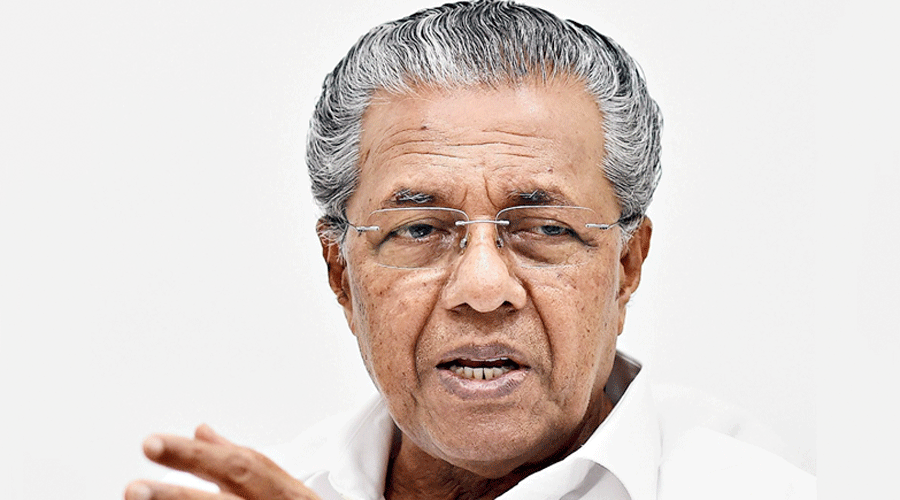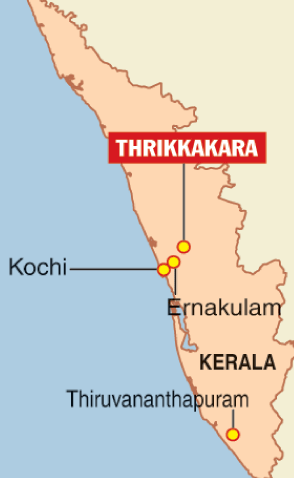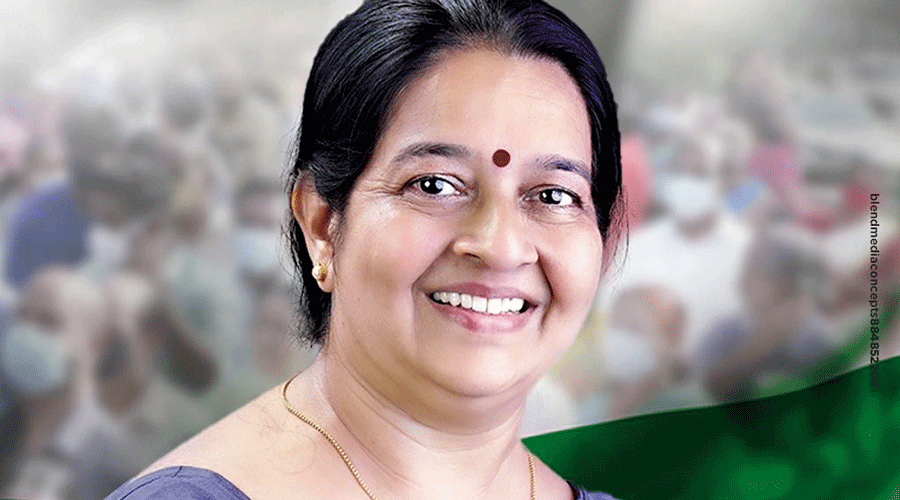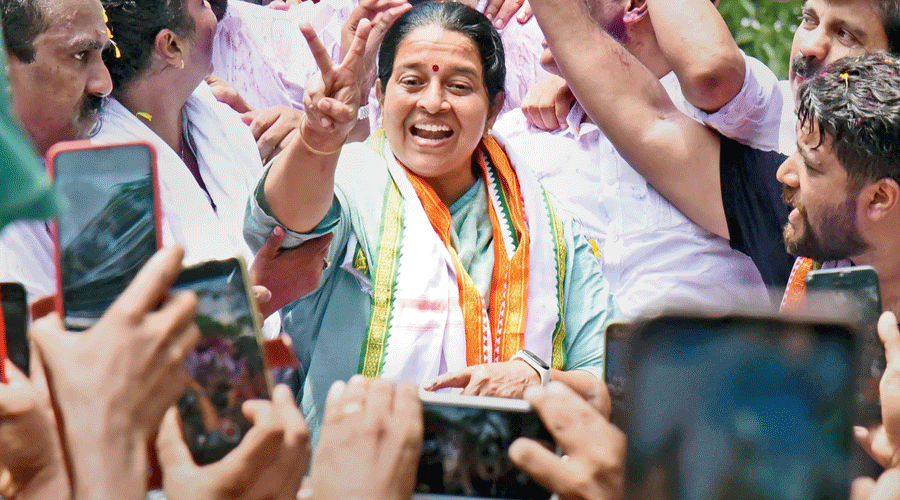Legend has it that Thrikkakara, located in the commercial capital of Kerala, traces its name to the greatest injustice meted out to Malayalis. The name means the place of the holy foot — Vamana, an avatar of Mahavishnu, apparently stamped on the head of Mahabali, the benevolent, if not a socialist, king who became a threat to the devas, and pushed him down to the netherworld.
This week, Thrikkakara did not allow history (or myth) to repeat itself: it refused to swallow a polarisation bait that was sought to be shoved down its throat by the big brother of all secular parties.
The event was a mere by-election to an Assembly seat whose outcome has no bearing on the longevity of the CPM-led Left Democratic Front government, led by Pinarayi Vijayan, the only chief minister to have returned to power without a break after completing a full term in Kerala.
The winner was also a foregone conclusion: Uma Thomas, whose husband P.T. Thomas’s death necessitated the by-election in what is considered one of the few safe seats for the Congress-led Opposition front in the state.

Pinarayi Vijayan. File picture
Until Vijayan and the CPM decided to play.
The avowed goal was a century: Vijayan, whose grip on the party and the government is as tight as that of Narendra Modi on the BJP and the Union government, wanted to round off the Left front’s 99-seat tally to 100 in the 140-member Assembly.
What Pinarayi and the Party played was not cricket but what many see as a communal and caste ploy that goes against its progressive image. This in itself is not news. Both fronts in Kerala have played such cards earlier — as have many parties across the country. Only the degree has varied.
The key difference this time is that Thrikkakara, once a helpless witness to the inexcusable divine foot-stamping, voted with its feet this week.
The Thrikkakara seat elected Uma with a 25,000-plus margin, a record for the seat.
Had the CPM-led front treated the Thrikkakara by-election as just another opportunity to try and wrest a Congress stronghold, Friday’s defeat would have brought little blame or shame.

Now, Thrikkakara has emerged as a contrarian that swam against the tide threatening to engulf the country with a message: polarisation need not always work at the hustings.
Without doubt, the sympathy factor and the way Uma conducted herself on the campaign trail — she went to a BJP office to seek votes, prompting Left supporters to smell and jump to allege a deal, a claim that collapsed when she strode into a Citu office and was welcomed warmly by the workers there — played a decisive role in ensuring her victory.
But political analysts have underlined how the CPM went against local leaders’ wishes to foist a rookie candidate — cardiologist Jo Joseph — just because he was a Christian, appeared to insinuate that he had the Church’s blessings and allegedly sent separate campaigners to meet separate caste and religious groups.
The CPM has introduced Joseph as the candidate at the Church-run Lisie Hospital in Ernakulam instead of using the party office that was just a short drive away.
With Joseph flanked by a Catholic priest at the news conference, tongues began wagging. But the candidate insisted he was a party member and not a Church nominee, and explained that the priest was the hospital’s director.
But the CPM tacitly projected Joseph as a candidate who had the blessings of the Major Archbishop of the powerful Syro-Malabar Church, Cardinal George Alancherry. It didn’t just dent the Left’s secular image, it proved electorally counterproductive because the Church was divided, with a strong faction staunchly opposed to the cardinal, lawyer and political commentator A. Jayashankar said in a YouTube video.
“He (Joseph) is from Poonjar (in central Kerala where the majority among the laity support the cardinal). But the big issue in Thrikkakara was that the majority, including parish priests, were against the cardinal,” he said.
The vicars of 22 of the 24 parishes of the Church in the Thrikkakara constituency were against the cardinal. “The more dominant anti-cardinal group spread the word that the CPM candidate had the approval of the cardinal. They even announced that in the churches,” Jayashankar said.
At least one Christian outfit openly announced support for the CPM candidate.
Further, the CPM did itself no favour by allegedly assigning ministers and lawmakers to meet mostly families and groups from their own caste and religious communities. The CPM denies the charge.
“You can’t fool the voters of Thrikkakara, who have a basic sense of democratic values,” Jayashankar said.
A former spokesperson for the Syro-Malabar Church, the outspoken Fr Paul Thelekkat, said in Kochi on Saturday that the CPM “made a big mistake by playing the communal card”.
“The attempt brought exactly the opposite reaction. Politicians should realise that the people have common sense,” Thelekkat, one of the first clergymen to criticise the CPM for projecting Joseph as a Church candidate, said.
The Congress’s record win also carries a lesson for the BJP, which had stuck to its own brand of communal politics and deployed senior politician P.C. George in the campaign to woo Christian voters. George, a former Kerala Congress (Mani) MLA, had recently endeared himself to the BJP by maligning Muslims. Vijayan did crack down hard on George by getting him arrested twice, after which the motor-mouth secured bail.
BJP candidate A.N. Radhakrishnan, however, lost his security deposit, polling just 12,957 votes against the 15,483 the party had received from the constituency in the Assembly polls.
Film actor and political commentator Joy Mathew sees the result as a template for Kerala’s voters to follow.
“The Thrikkakara by-election result has become very important since it is a model that Kerala’s electorate should follow. The historic win of Uma Thomas is proof that the double standard of appeasing any community for a few votes and justifying the air-dropping of a candidate suitable for such an agenda won’t work in Kerala,” Mathew wrote in an article carried by the Malayala Manorama newspaper on Saturday.
“This is a red mark on the progress card of those who declare themselves the apostles of a progressive ideology but end up with an anti-people and ridiculous regime.”
One of the reasons the Vijayan government has had to endure the label of “anti-people” is the controversial K-Rail, the chief minister’s pet semi-high-speed railway project. The Left’s development plank for Thrikkakara included a promise to turn the area into the state’s transport hub via the K-Rail, but this seems not to have worked, either.
The initial confusion about candidate selection – usually a Congress affliction that the party avoided with remarkable alacrity this time -- also damaged the CPM’s prospects.
The decision of an apolitical but influential outfit called Twenty20 and the Aam Aadmi Party to sit out the by-election too is said to have helped the Congress. But then the question arises why the CPM had failed to attract these voters in spite of some leaders expressing hope initially that these voters would back the party.
Will the sectarian-agnostic Thrikkakara model find takers elsewhere in India?
Unlikely, for multiple reasons.
Thrikkakara has the highest number of urban voters in Kerala. It also has a sizeable population of professionals from other cities and states who are not bothered about local caste and religious factors.
Besides, its melting-pot demographic mix is unlikely to be replicated outside Kerala: Christians account for over 27 per cent of the population of Thrikkakara municipality, Muslims 21 per cent and Hindus 49 per cent. The delicate balance ensures that any overt communal card can be neutralised by the other two communities tilting towards a more neutral candidate. Almost all voters are literate, too.
The CPM dismisses all the charges of communalism and casteism and insists that the by-election result was in line with its expectations in the traditional Congress seat.
The braver among the comrades have gone to the extent of claiming the CPM has improved its position by over 2,000 votes. Arithmetically, it’s correct: Joseph polled 47,754 votes, a little over the 45,510 the party had tallied from the seat in last year’s Assembly polls. Only, Uma polled 25,016 votes more than Jo.
There will never be a consensus on what unfolded in Thrikkakara this week. But those who yearn for happy endings will hope that Mahabali, who is allowed to revisit Kerala every Onam, the biggest festival in the state, will have reason to be proud when the portly king comes calling in August-September this year.











